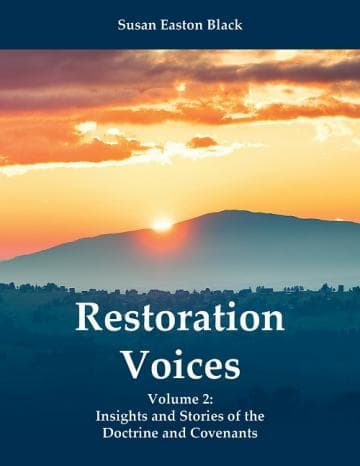Book
140 Chapters

Years before the Prophet Joseph Smith announced the doctrine of baptism for the dead, glimpses of the glorious principle were revealed to him. In 1836 in an upper room of the Kirtland Temple, the Prophet exclaimed, “I [see] Fathers Adam and Abraham, and my father and mother, [and] my brother, Alvin, that has long since slept.” In reference to Alvin, he “marveled how it was that he had obtained an inheritance in that kingdom, seeing that he had departed this life before the Lord had set His hand to gather Israel the second time, and had not been baptized for the remission of sins.” When Joseph sought clarification as to how his beloved brother could have inherited celestial glory, the voice of the Lord declared, “All who have died without a knowledge of this Gospel, who would have received it if they had been permitted to tarry, shall be heirs of the celestial kingdom of God, ... for I, the Lord, will judge all men according to their works, according to the desires of their hearts” (D&C 137:7, 9).[1]
In July 1838, in reply to the query “What has become of all those who have died since the days of the apostles?” Joseph answered, “All these who have not had an opportunity of hearing the gospel, and being administered unto by an inspired man in the flesh, must have it hereafter, before they can be finally judged.”[2]
Two years passed before Joseph again spoke of the deceased hearing the gospel of Jesus Christ. The occasion was the funeral for Seymour Brunson, a high councilor and bodyguard of the Prophet. Forty-year-old Brunson died on August 10, 1840, in Joseph Smith’s home. “For awhile he desired to live and help put over the work of the Lord but gave up and did not want to live,” stated his descendants. “After calling his family together, blessing them and bidding them farewell,” he succumbed.[3]
On August 15, 1840, his funeral was held at the burial ground overlooking Nauvoo. According to Heber C. Kimball, the procession to the burial ground was “judged to be one mile long.”[4] Once the processional reached the site, mourners listened as the Prophet Joseph eulogized Seymour Brunson. It is reported that Joseph read 1 Corinthians, chapter 15, where the Apostle Paul was “talking to a people who understood baptism for the dead, for it was practiced among them” (see John 3:5). Then, seeing a widow whose son had died without baptism, the Prophet added, “This widow [had read] the sayings of Jesus ‘except a man be born of water and of the spirit he cannot enter the kingdom of heaven,’ and that ‘not one jot nor tittle of the Savior’s words should pass away, but all should be fulfilled.’”
The Prophet Joseph announced that the Saints could now “act for their friends who had departed this life, and that the plan of salvation was calculated to save all who were willing to obey the requirements of the law of God.”[5] Jane Nyman, whom historians suggest was the widow Joseph saw at the funeral, went down to the Mississippi and was baptized in behalf of her deceased son, Cyrus Livingston Nyman, by Harvey Olmstead.
From that time forward, other Saints waded knee-deep into the Mississippi River to be baptized as proxy for their deceased kindred and friends. As for the Prophet Joseph, he continued to receive revelations that clarified the new doctrine. “If the dead rise not at all, why are they then baptized for the dead?” Joseph asked his followers. “If we can, by the authority of the Priesthood of the Son of God, baptize a man in the name of the Father, of the Son, and of the Holy Ghost, for the remission of sins, it is just as much our privilege to act as an agent, and be baptized for the remission of sins for and in behalf of our dead kindred, who have not heard the Gospel, or the fullness of it.”[6]
Of the prophet’s teachings on baptism for the dead, Wilford Woodruff penned, “I remember well the first time I read the revelation given through the Prophet Joseph concerning the redemption of the dead—one of the most glorious principles I had ever become acquainted with on earth. ... Never did I read a revelation with greater joy than I did that revelation.”[7]
[1] Smith, History of the Church, 2:380
[2] Elders’ Journal 1 (July 1838), 43.
[3] Arlene Bishop Hecker, “History of Seymour Brunson,” 4. Church History Library.
[4] Andrew F. Ehat and Lyndon W. Cook, The Words of Joseph Smith (Provo, UT: Religious Studies Center, Brigham Young University, 1980), 49.
[5] Simon Baker, reporting a discourse given by Joseph Smith on August 15, 1840, in Nauvoo, Illinois; in Journal History of The Church of Jesus Christ of Latter-day Saints, August 15, 1840; see Smith, History of the Church, 4:231.
[6] Smith, History of the Church, 4:569.
[7] Wilford Woodruff, Journal, April 6, 1891. Church History Library.
Book
140 Chapters
Items in the BMC Archive are made publicly available for non-commercial, private use. Inclusion within the BMC Archive does not imply endorsement. Items do not represent the official views of The Church of Jesus Christ of Latter-day Saints or of Book of Mormon Central.